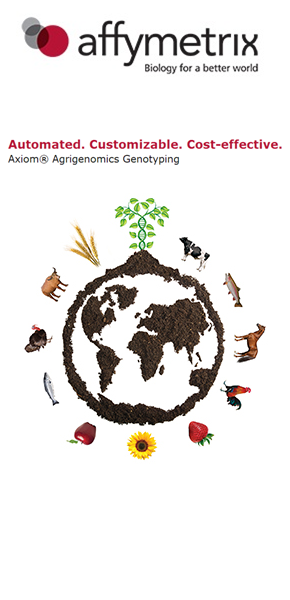Abstract
In 2000, plant genomics was kick-started when a common weed, A. thaliana, was sequenced and promoted to celebrity status as a model species. However, advances in many important plant species were hindered by the complexity of their genomes. Now, a historic opportunity presents itself. The challenge of global food security has brought plant research and breeding into sharp focus. At the same time, a technology revolution means that large, complex, polyploid genomes are becoming accessible. The thought leaders on our panel will:
- Discuss how they overcome the challenges of interrogating complex genomes
- Explain how they have integrated and automated genomic technologies to make rapid progress towards research and application goals
- Describe how genomic strategies can be applied to areas such as population diversity, trait mapping and breeding
View on demand
Sponsor
Affymetrix
Automated. Customizable. Cost-effective.
Axiom® Agrigenomics Genotyping
Affymetrix is transforming genomics in agriculture with easy, flexible genotyping. Axiom® agrigenomics genotyping provides breeders and researchers with powerful SNP genotyping tools to identify, validate, and screen complex genetic traits in plants or animals, diploids or polyploids
Custom designs for any species
With Axiom® myDesign™ Custom Genotyping Arrays, you can create SNP and indel genotyping array panels in 96- or 384-array plate formats. Design a marker panel for your species of interest or save money by designing an array for multiple species.
Pre-designed arrays
Select arrays or sub-select content from our catalog of high-density agrigenomics genotyping products, including chicken, bovine, buffalo, and strawberry. Our portfolio of highly reproducible arrays facilitates marker-trait associations, GWAS, and QTL analyses.
Axiom automated data analysis
Axiom® Software features a clustering algorithm that automatically assigns genotypes for accurate, simplified genotyping of diploids and polyploids. Analysis takes one hour, regardless of the number of SNPs. Save days of tedious manual genotype editing!
Moderator and Speakers
Moderator
Clare Garvey, Editor – Genome Biology, BioMed Central, UK
Dr Clare Garvey joined the Genome Biology team in 2007 after working as an Assistant Editor at Nature Publishing Group. At BioMed Central, Clare and her team manages the peer-review of manuscripts in addition to commissioning reviews and other interesting articles for publication. Dr Garvey's background is Drosophila developmental genetics. Before moving into publishing Clare undertook two postdocs in Cambridge, UK.
Speakers
Etienne Paux, INRA, France
Dr Etienne Paux is a project leader in wheat genomics working at the French National Institute for Agronomic Research (INRA). He has recognized expertise in structural and functional genomics as well as in marker development and genotyping. His research is divided in two main axis. On the fundamental side, his main interest is in deciphering the organization, function and evolution of the wheat gene space. In 2008, he and his group reported on the construction of the first physical map of a wheat chromosome. He is currently involved in the sequencing of this chromosome. On the applied side, he developed a new type of molecular markers called Insertion Site–Based Polymorphisms (ISBPs) that allow for genome–specific genotyping in polyploid species. Over the past four years, he has been coordinating several initiatives aiming at developing SNPs and technologies for high throughput genotyping and marker–assisted selection in wheat.
Doreen Ware, USDA ARS, Adjunct Associate Professor, Cold Spring Harbor Laboratory
Dr Doreen Ware is a research scientist with the United States Department of Agriculture, Agricultural Research service. She is recognized for her work on genome annotations and functional genomics in plants. Dr Ware's research is divided into two main areas. Her first area of research involves genome organization and evolution. How are genes conserved and lost? What are the fates of duplicated genes? Dr Ware's other area of research focuses on understanding gene regulation in plants, specifically looking at regulatory networks enriched for microRNA genes. In 2009 her group was involved in the release of the maize genome sequence and HapMap. Over the past 5 years she has been actively involved in several infrastructure projects that support standard development within the plant genomics community.
 Menu
Menu
